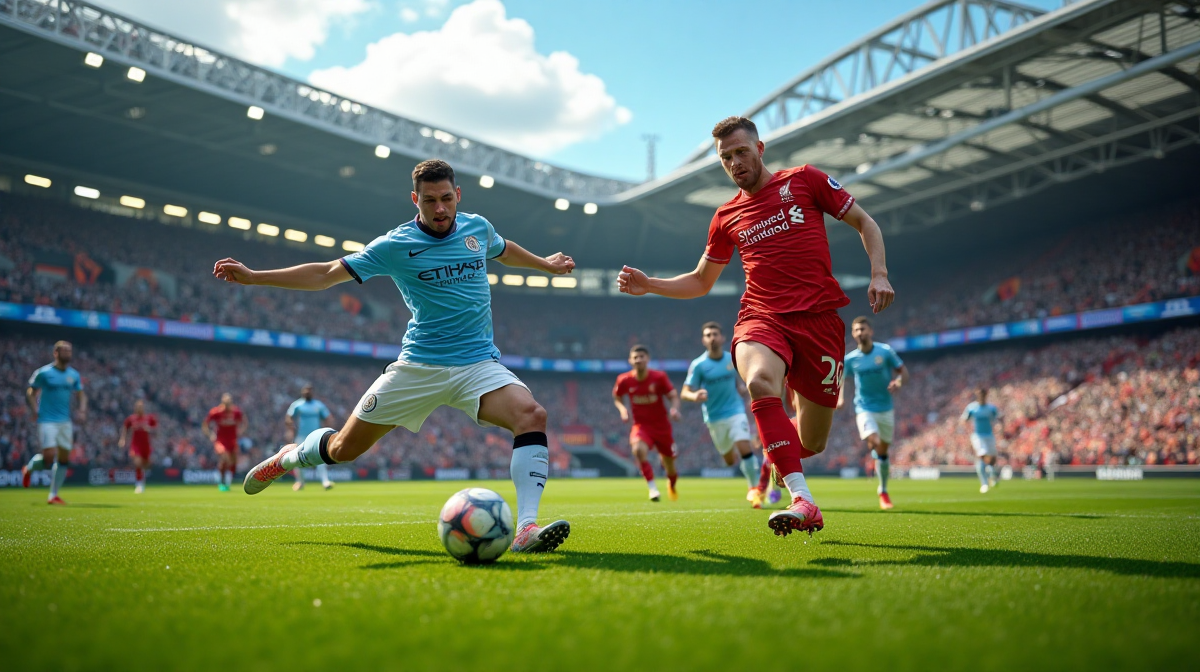Top 10 Richest Premier League Clubs (2024)
Introduction: Premier League Financial Powerhouses
The English Premier League stands as a global sporting and financial behemoth. Its clubs consistently rank among the world’s most valuable sports teams, drawing immense revenue from a variety of sources. Understanding the financial landscape of the league requires delving into the revenue streams that fuel these powerhouses. For fans looking for excitement beyond the pitch, platforms like m sport bet offer opportunities to engage with the games in a new way.
The Growing Financial Landscape of the Premier League
The Premier League's financial growth has been exponential over the past three decades. Initially driven by broadcasting rights, the league has successfully expanded its reach into new global markets, attracting sponsorships and developing extensive commercial operations. This rapid growth has created a competitive environment where clubs constantly strive for financial supremacy.
Methodology: How Club Wealth is Measured
This ranking focuses primarily on annual revenue generated by each club. While valuations (which include asset worth) are important, revenue provides a clearer picture of a club’s financial strength and operational success. Figures are based on the 2023/24 season data, including broadcasting income, commercial deals, matchday revenue, and other associated earnings. Many fans also enjoy adding to the excitement by checking m sport bet registration options before a match.
Key Factors Driving Revenue Growth
Three key pillars support Premier League club revenue: broadcasting rights (domestic and international), lucrative sponsorship deals with global brands, and matchday income (ticket sales, hospitality, and merchandise). The Premier League’s broadcasting deals are the most significant revenue driver, followed closely by commercial partnerships. For those looking to bet on the league, understanding team performance and financial backing can inform choices on platforms like m sport bet.

#1 - Manchester City: Dominance On and Off the Pitch
Manchester City currently sits atop the Premier League’s financial hierarchy, a testament to its sustained success both on and off the pitch.
Revenue Breakdown - Detailed figures
Manchester City reported revenues exceeding £712 million for the 2023/24 season. Broadcasting revenue accounts for roughly £360 million, commercial revenue around £260 million, and matchday income approximately £92 million.
Ownership & Investment - City Football Group Analysis
The City Football Group (CFG), the ownership structure behind Manchester City, has been instrumental in its financial success. CFG's multi-club network allows for strategic resource allocation and global brand building.
Commercial Success - Sponsorship Deals & Global Brand
City’s commercial prowess is evident in its extensive sponsorship portfolio, including deals with Puma, Etihad Airways, and others. A strong global brand extends its reach beyond the UK. Even while following their team, many fans utilize m sport bet login to enhance their viewing experience.
On-Pitch Performance & Financial Rewards - Champions League Impact
Consistent success in the Champions League provides significant financial rewards, boosting revenue and attracting further investment.
#2 - Arsenal: Renewed Financial Strength
Arsenal has experienced a resurgence in both on-pitch performance and financial stability in recent years.
Revenue Breakdown - Detailed figures
Arsenal’s revenue for the 2023/24 season reached approximately £613 million. Broadcasting revenue comprises around £240 million, commercial revenue approximately £220 million, and matchday income around £153 million.
Kroenke Sports & Entertainment's Influence
The ownership of Kroenke Sports & Entertainment (KSE) has been a subject of debate, but their investment has contributed to Arsenal’s financial growth.
Commercial Growth - Adidas Deal & Expanding Global Fanbase
A lucrative kit deal with Adidas and a growing global fanbase have significantly boosted Arsenal’s commercial revenue.
Return to Champions League & Projected Revenue Increase
Qualifying for the Champions League has resulted in a substantial revenue increase and is set to further enhance the club’s financial position.

#3 - Manchester United: Legacy & Continued Revenue
Despite recent on-pitch struggles, Manchester United remains a global commercial powerhouse.
Revenue Breakdown - Detailed figures
Manchester United reported revenue of around £648 million for the 2023/24 season. Broadcasting revenue accounts for approximately £260 million, commercial revenue around £300 million, and matchday income around £88 million.
Glazer Ownership – Ongoing Debate & Financial Impact
The Glazer family’s ownership continues to be a contentious issue, but they’ve overseen significant commercial growth.
Global Brand Power & Merchandising Revenue
Manchester United’s global brand recognition translates into substantial merchandising revenue, making it a key component of their financial success.
Challenges & Opportunities - On-Pitch Performance and Financial Recovery
Improving on-pitch performance is crucial for unlocking further revenue potential and regaining dominance.
#4 - Liverpool: Sustainable Financial Model
Liverpool has established a sustainable financial model based on strong commercial partnerships and consistent success.
Revenue Breakdown - Detailed figures
Liverpool generated revenues of approximately £585 million for the 2023/24 season. Broadcasting revenue accounts for around £250 million, commercial revenue approximately £210 million, and matchday income around £125 million.
Fenway Sports Group's Ownership Strategy
Fenway Sports Group’s ownership has focused on building a financially stable club with a long-term vision.
Commercial Partnerships - Nike Deal & Sponsorship Growth
A lucrative kit deal with Nike and growing sponsorship portfolio have contributed to Liverpool’s commercial success.
On-Pitch Success & Champions League Revenue
Consistent success in the Champions League provides a significant revenue boost.
#5 - Tottenham Hotspur: Stadium & Commercial Growth
Tottenham Hotspur has benefited significantly from its state-of-the-art stadium and growing commercial operations.
Revenue Breakdown - Detailed figures
Tottenham Hotspur generated revenues of around £446 million for the 2023/24 season. Broadcasting revenue accounts for approximately £200 million, commercial revenue around £160 million, and matchday income around £86 million.
New Stadium Impact & Revenue Generation
The new Tottenham Hotspur Stadium has become a major revenue driver, hosting a variety of events beyond football matches.
ENIC Group Ownership & Investment
ENIC Group’s ownership has overseen the development of the new stadium and a strategic focus on commercial growth.
Commercial Strategy & Partnerships
Tottenham has actively pursued new commercial partnerships to expand its revenue streams.
#6 - Chelsea: New Ownership, New Financial Era
Chelsea is navigating a new financial era under its new ownership group.
Revenue Breakdown - Detailed figures
Chelsea reported revenues of approximately £482 million for the 2023/24 season. Broadcasting revenue accounts for around £220 million, commercial revenue approximately £180 million, and matchday income around £82 million.
Todd Boehly-Clearlake Capital Ownership - Investment Changes
The new ownership group has made significant investment in the squad but is also focused on commercial growth and financial sustainability.
Commercial Restructuring and Partnership Building
Chelsea is actively restructuring its commercial operations and building new partnerships.
Balancing Financial Fair Play & Transfer Spending
Balancing Financial Fair Play regulations with ambitious transfer spending is a key challenge for the new ownership.
#7 - Newcastle United: Rise With New Investment
Newcastle United has experienced a rapid rise in fortunes following its acquisition by a new ownership group.
Revenue Breakdown - Detailed figures
Newcastle United’s revenue for the 2023/24 season reached approximately £253 million. Broadcasting revenue accounts for around £130 million, commercial revenue approximately £80 million, and matchday income around £43 million.
PIF Ownership - Scale and Impact on Club Finances
The Public Investment Fund (PIF) ownership has injected significant capital into the club, enabling substantial investment in the squad and infrastructure.
Commercial Growth & Partnership Opportunities
Newcastle is actively pursuing new commercial partnerships to capitalize on its increased profile.
Champions League Qualification & Future Revenue Potential
Qualifying for the Champions League will unlock significant revenue opportunities.
#8 - Aston Villa: Growing Ambition & Financial Strength
Aston Villa is demonstrating growing ambition and financial strength under its current ownership.
Revenue Breakdown - Detailed figures
Aston Villa generated revenue of around £180 million for the 2023/24 season. Broadcasting revenue accounts for around £90 million, commercial revenue approximately £60 million, and matchday income around £30 million.
Nassef Sawiris & Wes Edens Ownership
The ownership of Nassef Sawiris and Wes Edens has provided the financial backing for Aston Villa’s resurgence.
Commercial Partnerships & Brand Building
Aston Villa is actively building its brand and securing new commercial partnerships.
European Qualification & Revenue Implications
European qualification will significantly boost the club’s revenue.
#9 - West Ham United: Consistent Revenue Stream
West Ham United has maintained a consistent revenue stream through a combination of broadcasting income and commercial deals.
Revenue Breakdown - Detailed figures
West Ham United generated revenues of approximately £200 million for the 2023/24 season. Broadcasting revenue accounts for around £110 million, commercial revenue approximately £60 million, and matchday income around £30 million.
David Sullivan & David Gold Ownership
Recent changes in ownership structure are expected to impact the club’s long-term financial strategy.
Sponsorship Deals & Commercial Focus
West Ham has focused on securing sponsorship deals to boost its commercial revenue.
European Football & Increased Revenue
Participation in European competitions provides an additional revenue stream.
#10 - Brighton & Hove Albion: Strategic Growth & Financial Prudence
Brighton & Hove Albion has achieved remarkable success through strategic growth and financial prudence.
Revenue Breakdown - Detailed figures
Brighton & Hove Albion generated revenue of around £160 million for the 2023/24 season. Broadcasting revenue accounts for around £80 million, commercial revenue approximately £50 million, and matchday income around £30 million.
Tony Bloom’s Ownership & Model
Tony Bloom’s ownership has been characterized by a data-driven approach and a focus on player development.
Player Trading & Scouting Network - Revenue Generation
Brighton’s successful player trading and scouting network generates significant revenue.
European Qualification & Expanding Brand
European qualification is expanding the club’s brand and attracting new commercial opportunities.
Financial Fair Play & its Impact on Premier League Clubs
Overview of FFP Regulations
Financial Fair Play (FFP) regulations, implemented by UEFA and mirrored in various forms by the Premier League, are designed to promote financial sustainability and prevent clubs from spending beyond their means. These regulations aim to create a more level playing field and protect the long-term viability of football clubs.
How FFP Affects Club Spending and Revenue Management
FFP rules generally limit the amount clubs can spend on player wages, transfers, and agent fees relative to their revenue. Clubs must demonstrate that they are not relying on excessive external funding from their owners.
Potential Consequences of FFP Breaches
Breaching FFP regulations can result in a range of sanctions, including fines, transfer embargoes, points deductions, and even exclusion from European competitions.
Looking Ahead: Future Trends in Premier League Finance
Increasing Importance of Global Fan Engagement
Premier League clubs are increasingly focused on engaging with their global fan base through digital platforms and international tours. Building a strong international following is critical for driving commercial revenue.
The Role of Digital Revenue Streams
Digital revenue streams, such as streaming services and Non-Fungible Tokens (NFTs), are expected to become increasingly important for Premier League clubs.
Potential Impact of New Broadcasting Deals
The next round of Premier League broadcasting deals will have a significant impact on club revenues. Competition for broadcasting rights is fierce, potentially leading to further increases in income. As the season approaches, fans are eager to know when does premier league start and plan their viewing accordingly – and perhaps place a bet on m sport bet!

